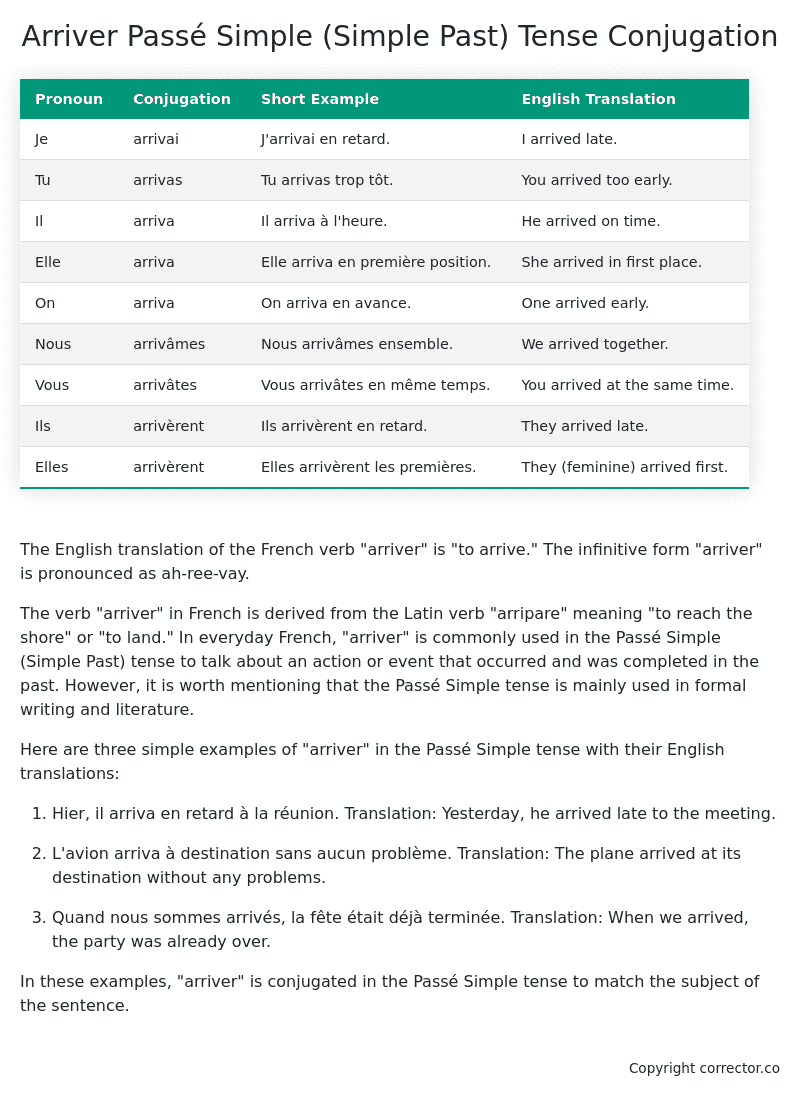Passé Simple (Simple Past) Tense Conjugation of the French Verb arriver
Introduction to the verb arriver
The English translation of the French verb “arriver” is “to arrive.” The infinitive form “arriver” is pronounced as ah-ree-vay.
The verb “arriver” in French is derived from the Latin verb “arripare” meaning “to reach the shore” or “to land.” In everyday French, “arriver” is commonly used in the Passé Simple (Simple Past) tense to talk about an action or event that occurred and was completed in the past. However, it is worth mentioning that the Passé Simple tense is mainly used in formal writing and literature.
Here are three simple examples of “arriver” in the Passé Simple tense with their English translations:
-
Hier, il arriva en retard à la réunion.
Translation: Yesterday, he arrived late to the meeting. -
L’avion arriva à destination sans aucun problème.
Translation: The plane arrived at its destination without any problems. -
Quand nous sommes arrivés, la fête était déjà terminée.
Translation: When we arrived, the party was already over.
In these examples, “arriver” is conjugated in the Passé Simple tense to match the subject of the sentence.
Table of the Passé Simple (Simple Past) Tense Conjugation of arriver
| Pronoun | Conjugation | Short Example | English Translation |
|---|---|---|---|
| Je | arrivai | J’arrivai en retard. | I arrived late. |
| Tu | arrivas | Tu arrivas trop tôt. | You arrived too early. |
| Il | arriva | Il arriva à l’heure. | He arrived on time. |
| Elle | arriva | Elle arriva en première position. | She arrived in first place. |
| On | arriva | On arriva en avance. | One arrived early. |
| Nous | arrivâmes | Nous arrivâmes ensemble. | We arrived together. |
| Vous | arrivâtes | Vous arrivâtes en même temps. | You arrived at the same time. |
| Ils | arrivèrent | Ils arrivèrent en retard. | They arrived late. |
| Elles | arrivèrent | Elles arrivèrent les premières. | They (feminine) arrived first. |
Other Conjugations for Arriver.
Le Present (Present Tense) Conjugation of the French Verb arriver
Imparfait (Imperfect) Tense Conjugation of the French Verb arriver
Passé Simple (Simple Past) Tense Conjugation of the French Verb arriver (You’re reading it right now!)
Passé Composé (Present Perfect) Tense Conjugation of the French Verb arriver
Futur Simple (Simple Future) Tense Conjugation of the French Verb arriver
Futur Proche (Near Future) Tense Conjugation of the French Verb arriver
Plus-que-parfait (Pluperfect) Tense Conjugation of the French Verb arriver
Passé Antérieur (Past Anterior) Tense Conjugation of the French Verb arriver
Futur Antérieur (Future Anterior) Tense Conjugation of the French Verb arriver
Subjonctif Présent (Subjunctive Present) Tense Conjugation of the French Verb arriver
Subjonctif Passé (Subjunctive Past) Tense Conjugation of the French Verb arriver
Subjonctif Imparfait (Subjunctive Imperfect) Tense Conjugation of the French Verb arriver
Subjonctif Plus-que-parfait (Subjunctive Pluperfect) Tense Conjugation of the French Verb arriver
Conditionnel Présent (Conditional Present) Tense Conjugation of the French Verb arriver
Conditionnel Passé (Conditional Past) Tense Conjugation of the French Verb arriver
Conditionnel Passé II (Conditional Past II) Tense Conjugation of the French Verb arriver
L’impératif Présent (Imperative Present) Tense Conjugation of the French Verb arriver
L’impératif Passé (Imperative Past) Tense Conjugation of the French Verb arriver
L’infinitif Présent (Infinitive Present) Tense Conjugation of the French Verb arriver
L’infinitif Passé (Infinitive Past) Tense Conjugation of the French Verb arriver
Le Participe Présent (Present Participle) Tense Conjugation of the French Verb arriver
Le Participe Passé (Past Participle) Tense Conjugation of the French Verb arriver
Struggling with French verbs or the language in general? Why not use our free French Grammar Checker – no registration required!
Get a FREE Download Study Sheet of this Conjugation 🔥
Simply right click the image below, click “save image” and get your free reference for the arriver Passé Simple tense conjugation!

Arriver – About the French Passé Simple (Simple Past) Tense
Formation
Usage
Narration
Historical Context
Interactions with other tenses
Passé Composé
Imparfait
Conditional and Subjunctive
Summary
I hope you enjoyed this article on the verb arriver. Still in a learning mood? Check out another TOTALLY random French verb conjugation!


